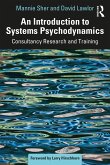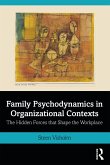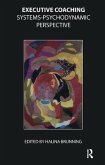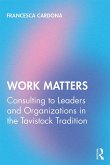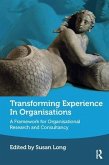Through a series of in-depth interviews with Tavistock thinkers across three generations, this volume illustrates the practice and application of the systems psychodynamics paradigm to organisational development consultancy, research and training.
Across 28 stimulating interviews with a group of international consultants, interviewees present a critical appraisal of the systems psychodynamics paradigm and its application to present-day social and organisational difficulties. By using a narrative interpretive method, the interviewers attend to the historical, psychosocial and biographical dynamics of the interviewees' approaches and methods of work, and address several areas of organisational consultancy. These include organisational design, the division of labour, levels of authority and reporting relationships; the nature of work tasks, processes and activities; primary tasks and the inevitable unconscious dynamics within systems and individuals.
The multi-disciplinary approaches of the interviewees will interest managers, policymakers, consultant practitioners and researchers to understand the variety of applications of systems psychodynamics methodologies.
Across 28 stimulating interviews with a group of international consultants, interviewees present a critical appraisal of the systems psychodynamics paradigm and its application to present-day social and organisational difficulties. By using a narrative interpretive method, the interviewers attend to the historical, psychosocial and biographical dynamics of the interviewees' approaches and methods of work, and address several areas of organisational consultancy. These include organisational design, the division of labour, levels of authority and reporting relationships; the nature of work tasks, processes and activities; primary tasks and the inevitable unconscious dynamics within systems and individuals.
The multi-disciplinary approaches of the interviewees will interest managers, policymakers, consultant practitioners and researchers to understand the variety of applications of systems psychodynamics methodologies.
'This is a milestone publication - the outstanding chronicle to date of the multiple journeys of three generations engaged in systems psychodynamics. The book is bold and ambitious in its undertaking, yet neither presumptive nor prescriptive in its findings, letting breathe its selection of contributions, richly fertile and challenging in its depth and breadth of perspectives. The trilogy that Sher and Lawlor have produced is radically shifting the paradigm through which specialists and non-specialists have grown accustomed to understanding the worlds of psychology, psychoanalysis, work and consultancy. Group relations has had a decisive effect in helping us to appreciate that we are social selves, contributing to and shaped by the environments and systems in which we take up our roles. This work brings into sharper relief the object of study that we can call socioanalysis- the object is neither the individual nor an aggregate or average. The book itself when used to stimulate reflection and discussion will prove to be more than the sum of its parts. As learning is applied to different contexts of use, readers can draw out fresh and emerging narratives, which adapt to and evolve with experience. ost volumes of this type ossify, over-simplify or over-compartmentalise learning. This book has integrity: it lives the reality of the practice it documents and seeks to understand. It achieves that rare feat of deepening understanding yet sustaining curiosity and keeping alive our sense that work in this field is far from done. It is a work of immense skill and sophistication, carefully curated and elegantly woven with thinking evolving through open questions and honest and considered reflection. It is gently and evenly paced so that each contribution can be appreciated both in its own right and in relation to other work. In so far as the question of what makes a Tavistockian can be answered, this book provides deeply inspiring insights from a community of practice influenced by, and continually developing, Tavistock approaches, methodologies and training.'
Lucian Hudson, professor Lucian J. Hudson MA (Oxon) Cert (TIHR) FRSA; chair of Council, The Tavistock Institute of Human Relations
'In our working lives we all go about our business - as managers, leaders, nurses, consultants or whatever - within a world of ideas about what matters, what deserves attention and where the energy is to be found. These inner sense-making worlds are never entirely coherent, and systems-psychodynamics is one such world that is particularly suited to addressing the incoherent aspects - between desire and reality, conscious and unconscious, inspiring and deadening aspects of work. This invaluable collection of interviews gives us many perspectives on what it's like to work within this world; and will be of immense value (not a contradiction) to anyone approaching systems-psychodynamics consultancy as client, researcher or consultant.'
Jonathan Gosling, emeritus professor of Leadership, University of Exeter, UK; consultant with Pelumbra; non-exec director of DACS and Art360
'David Lawlor and Mannie Sher have produced an outstanding book in the field of organisational and system psychodynamics. It comprises a large number of verbatim interviews with leading consultancy theorists and practitioners from the past and present. It is extremely readable, and with some fascinating views of people like Wilfred Bion, Eric Miller, Eric Trist, Harold Bridger and many more. A must-read by all organisational psychologists, management consultants and anybody interested in the psychodynamics of groups and organisations. You won't want to miss this book!'
Sir Cary Cooper, CBE, 50th professor of Organizational Psychology & Health, ALLIANCE Manchester Business School, University of Manchester
'This collection offers unique insights to any consultant, practitioner or scholar interested in the development and significance of the Tavistock tradition of consulting to organisations. It brings together a fascinating range of first-person accounts from leading figures who have used systems psychodynamic insights into organisations grappling with the problems and contradictions of human organising. Concepts such as social defences, role, boundary, and countertransference come vividly to life, as three generations of scholarly practitioners illustrate in conversation how they have worked with organisations. Across this engaging and beautifully curated collection, we can see how over the years systemic psychodynamic thinking has been combined with other strands of theory and practical technique. We also learn about the varied backgrounds and motivations that have brought people to work in this way. A stimulating read at a time when there are so many pressing and difficult issues to be tackled in the world.'
Richard Holti, professor of Professional Learning, The Open University
Lucian Hudson, professor Lucian J. Hudson MA (Oxon) Cert (TIHR) FRSA; chair of Council, The Tavistock Institute of Human Relations
'In our working lives we all go about our business - as managers, leaders, nurses, consultants or whatever - within a world of ideas about what matters, what deserves attention and where the energy is to be found. These inner sense-making worlds are never entirely coherent, and systems-psychodynamics is one such world that is particularly suited to addressing the incoherent aspects - between desire and reality, conscious and unconscious, inspiring and deadening aspects of work. This invaluable collection of interviews gives us many perspectives on what it's like to work within this world; and will be of immense value (not a contradiction) to anyone approaching systems-psychodynamics consultancy as client, researcher or consultant.'
Jonathan Gosling, emeritus professor of Leadership, University of Exeter, UK; consultant with Pelumbra; non-exec director of DACS and Art360
'David Lawlor and Mannie Sher have produced an outstanding book in the field of organisational and system psychodynamics. It comprises a large number of verbatim interviews with leading consultancy theorists and practitioners from the past and present. It is extremely readable, and with some fascinating views of people like Wilfred Bion, Eric Miller, Eric Trist, Harold Bridger and many more. A must-read by all organisational psychologists, management consultants and anybody interested in the psychodynamics of groups and organisations. You won't want to miss this book!'
Sir Cary Cooper, CBE, 50th professor of Organizational Psychology & Health, ALLIANCE Manchester Business School, University of Manchester
'This collection offers unique insights to any consultant, practitioner or scholar interested in the development and significance of the Tavistock tradition of consulting to organisations. It brings together a fascinating range of first-person accounts from leading figures who have used systems psychodynamic insights into organisations grappling with the problems and contradictions of human organising. Concepts such as social defences, role, boundary, and countertransference come vividly to life, as three generations of scholarly practitioners illustrate in conversation how they have worked with organisations. Across this engaging and beautifully curated collection, we can see how over the years systemic psychodynamic thinking has been combined with other strands of theory and practical technique. We also learn about the varied backgrounds and motivations that have brought people to work in this way. A stimulating read at a time when there are so many pressing and difficult issues to be tackled in the world.'
Richard Holti, professor of Professional Learning, The Open University



